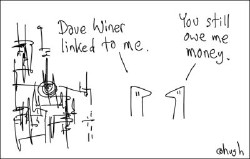
|
||||||||||||||||||||||||||||||||||||||||||||||||||||||
|
A few items following up on last night's Bug Labs piece.
3. I see various VCs commenting on the company. I wonder if there's a complete list of investors. Since we're talking about open technology, and a lot of trust is being asked for, it matters who's behind it. (Fred Wilson responds: Union Square, Spark Capital, Bob Young (Red Hat), Tom Evslin, Brad Feld and Albert Wenger.) 4. Other people they should brief: Phil Torrone, Steve Wozniak, Stewart Alsop. (I'll add them as I think of them.) 5. How refreshing that they didn't roll this out via Markoff. It probably would have been easy to get him interested, but it's nice that we got first shot at it. In a perfect world that wouldn't matter, but I guess this isn't a perfect world. 6. Bug Labs has a blog, and a feed. 7. Write-ups: Ryan Block, Robert Scoble. It doesn't look like a camera. When a Mexican band, with instruments, got on the BART yesterday, of course I wanted to take their picture. I just took out the iPhone, pretended I was reading email, opened the camera app and clicked the shutter. Voila! A picture of the band. |
Dave Winer, 52, pioneered the development of weblogs, syndication (RSS), podcasting, outlining, and web content management software; former contributing editor at Wired Magazine, research fellow at Harvard Law School, entrepreneur, and investor in web media companies. A native New Yorker, he received a Master's in Computer Science from the University of Wisconsin, a Bachelor's in Mathematics from Tulane University and currently lives in Berkeley, California. "The protoblogger." - NY Times.
"The father of modern-day content distribution." - PC World.
"Helped popularize blogging, podcasting and RSS." - Time.
"The father of blogging and RSS." - BBC.
"RSS was born in 1997 out of the confluence of Dave Winer's 'Really Simple Syndication' technology, used to push out blog updates, and Netscape's 'Rich Site Summary', which allowed users to create custom Netscape home pages with regularly updated data flows." - Tim O'Reilly.
My most recent trivia on Twitter. Comment on today's On This Day In: 2006 2005 2004 2003 2002 2001 2000 1999 1998 1997.
|
|||||||||||||||||||||||||||||||||||||||||||||||||||||
|
© Copyright 1997-2007 Dave Winer. Previous / Next |
||||||||||||||||||||||||||||||||||||||||||||||||||||||

 1. As Fred Wilson points out in his
1. As Fred Wilson points out in his  2. It almost goes without saying, but should be said anyway -- if Bug is any good, it should be possible to create the
2. It almost goes without saying, but should be said anyway -- if Bug is any good, it should be possible to create the 



